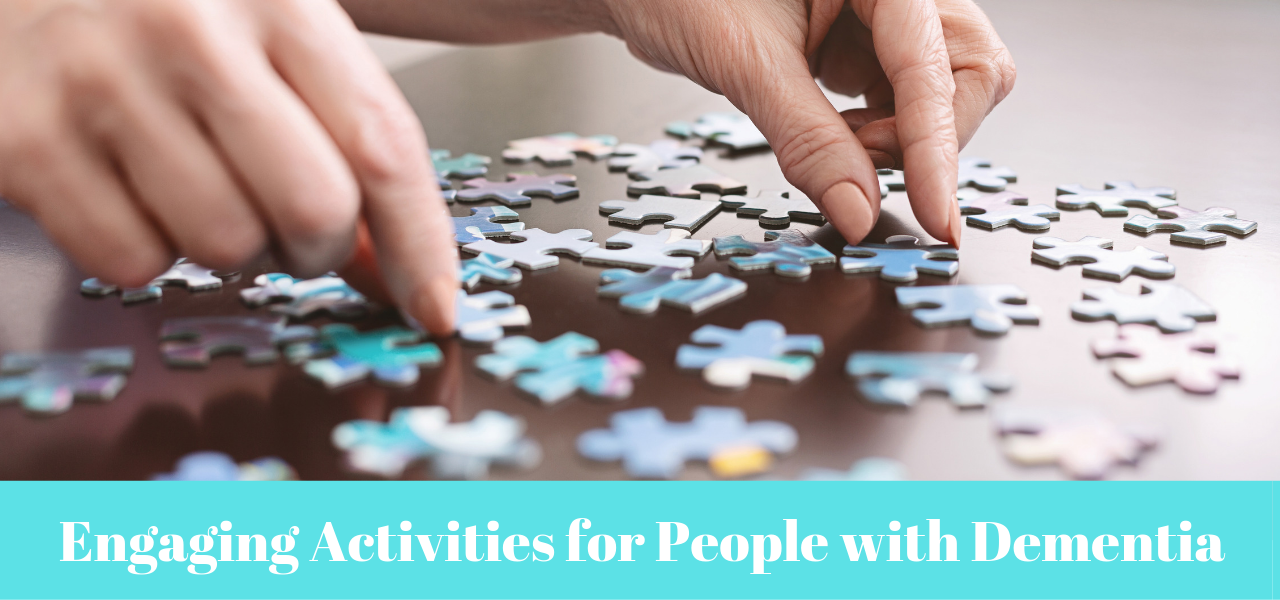
There is no cure for Alzheimer’s disease. Following a diagnosis, we must focus our efforts on living well with the disease and doing what we can to slow its progression. One way to improve the quality of life for people with dementia is to help them remain socially and actively engaged with the world around them. Learn more about the importance of engaging activities for people with dementia and get ideas for how to keep your loved one socially engaged.
Caregiver Tips for Dementia Activities
Engaging activities for people with dementia can promote independence, reduce isolation, and can help them cope with difficult emotions. Additionally, social activities can promote a sense of belonging, improve relationships, reinforce communication, and create a sense of purpose.
Before thinking through which activities you should plan with your loved one, consider these factors:
- What has your loved one enjoyed doing in the past?
- What frustrates your loved one?
- What are the signs that your loved one is losing interest or becoming agitated?
- When is the best time to attempt a new activity?
- Is your loved one’s environment too cluttered and distracting for a new activity?
- Will your loved one be safe doing this activity?
5 Stimulating Activities for People Living with Alzheimer’s Disease
Once you have considered your loved one’s preferences and well-being, choose an activity that is fun and meaningful. Here are 5 ideas to get you started.
Experience Leisure Care Senior Living

The Ackerly at Reed's Crossing
Independent Living, Assisted Living, and Memory Care in Hillsboro, Oregon
1. Gardening
Gardening is a great activity for people with dementia because it can be adapted as the disease progresses. Build a raised garden bed, start an indoor herb garden, and spend time daily tending the garden. If gardening becomes too much but your loved one still enjoys the plants, plan a trip to the local botanical garden.
2. Coloring
Adult coloring books are a great way to ease anxiety and reduce stress while managing other symptoms of dementia. Your loved one will be able to clearly see that he or she is making progress on a project, which can contribute to a sense of purpose and meaning.
4. Physical activity
This could include a wide range of activities that keep your loved one physically active. From golf to nature walks, getting active minutes is crucial to physical health as well as mental well-being. Set attainable goals and work together to reach milestones, adjusting as needed.
4. Puzzles
This is a great activity to help seniors with dementia visually see the progress they are making towards a goal. Find a scene that your loved one enjoys, maybe a seaside puzzle or a mountain view that reminds them of a previous time in his or her life. Make a little progress on it daily. If your loved one becomes frustrated easily, puzzles are easy to walk away from and come back to later.
5. Music
Studies have shown that music can have a positive effect on people with dementia, helping them recall memories and calming their anxiety. Create a playlist together, or create one on your own so that your loved one has familiar songs readily available.
As you plan your own activities for your loved one remember to keep any activity simple and limited to just one or two steps. Learn from mistakes and realize that it is okay if an activity does not work for where your loved one is right now. Pay attention to your loved one’s response and adjust your approach as needed. What activities do you do regularly with your loved one who has dementia? Share your comments with us in the section below. We’d love to hear from you!
Find a Leisure Care Community
Better with age, exceptional with us! Come and see how Leisure Care communities are helping seniors rediscover (and sometimes reinvent) themselves.







